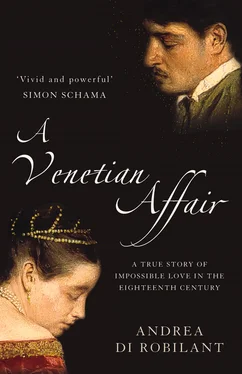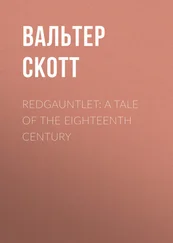Giustiniana, however, had not exhausted her rage. Andrea’s letters suddenly seemed so petty and predictable. Where was the strong, willful young man she had fallen so desperately in love with? In the increasingly frequent isolation of her room at Sant’Aponal, she decided to put an end to their love story. Better to make a clean break, as painful as it would be, than to endure the torture Andrea was inflicting upon her.
This is the last time I bother you, Memmo. Your conduct has been such that I now feel free to write you this letter. I do not blame you for your betrayal, your lack of gratitude, the scarcity of your love, your scorn. No, Memmo. I was very hurt by all this, but I’ve decided not to complain or to wallow in vindictive feelings. You know how much I have loved you; you know what a perfect friend I have been to you. God knows that I had staked my entire happiness on our love. You knew it. Yet you allowed me to believe that you loved me with the same intensity…. And now that I know you, that I see how you tricked me, I give you an even greater token of my passion by breaking this tenacious bond. After all your abuse, your disloyalty, I was already on the verge of abandoning you. But your scorn of the last few days, the lack of any effort on your part to explain yourself, your continuous indulgence in the things you know make me unhappy, your complete estrangement have finally made me see that you could not hope for a better development. I have opened my eyes, I have learned to know you and to know me, and I have become adamant in my resolution never to think again about a man capable of such cruelty, such contempt, such utter disloyalty to me .
So everything between us is over. I know I cannot give you a greater pleasure than this…. And I also know that my peace of mind, my well-being, maybe even my life will depend on this break. I shall never hate you (see how much I can promise), but I will feel both pleasure and displeasure in your happiness as well as in your misfortunes. I will say more: I will never again love anyone the way I have loved you, ungrateful Memmo. You will oblige me by handing over all my letters … as they serve no other purpose than to remind me of my weakness and your wickedness. So please give them back so that I may burn them and remove from my sight everything that might remind me of all I have done for such an undeserving man .
Here is your portrait, once my delight and comfort, which I don’t want anywhere near me. Ask the artist * to bring me the one you had commissioned of me—I will pay for it in installments and keep it. Your vanity has already been sufficiently satisfied as it is. Everyone knows how much I have loved you. Please don’t let me see you for another few days. I know how good our several days’ separation has been for me, and I have reason to believe that I will benefit by extending it. I forgive you everything. I have deserved this treatment because I was foolish enough to believe that you were capable of a sincere and enduring commitment; and I guess you are not really to blame if you can’t get over your own fickleness, which is so much a part of your nature. I ask neither your friendship nor a place in your memory. I want nothing more from you. Since I can no longer be the most passionate lover, I don’t want to be anything else to you. Adieu, Memmo, count me dead. Adieu forever .
Giustiniana’s dramatic break cleared the air. Within days the poisonous atmosphere that had overwhelmed them dissolved and they were in each other’s arms again, filled with love and desire. Giustiniana even laughed at her own foibles:
Oh God, my Memmo, how can I express these overflowing emotions? How can I tell you that … you are my true happiness, my only treasure? Lord, I am crazy. Crazy in the extreme. And what about all that happened to me in the last few days? Do you feel for me? … With my suspicions, my jealousy, my love…. Only you can understand me because you know my heart and the power you have over it…. I don’t know how my mood has changed so quickly, and why I even run the risk of telling you this! No, I really don’t know what’s happening to me…. Anyway, we’ll see each other tomorrow. Meanwhile I think I’ll just go straight to bed. After having been wrapped up in sweet thoughts about my Memmo and so full of him, I couldn’t possibly spend the rest of the evening with the silly company downstairs!
Andrea was so eager to hold Giustiniana in his arms again that even the twenty-four-hour wait now seemed unendurable to him. Alone in his room at Ca’ Memmo he let himself drift into erotic fantasies, which he promptly relayed to his lover:
Oh, my little one, my little one, may I entertain you with my follies? Do you have a heart to listen? I am so full of dreams about you that the slightest thing is enough to put me into a cosmic mood. For example, I read one of your letters … and I focus on a few characters in your handwriting and I begin to stare at them and I tell myself: here my adorable Giustiniana wrote … and sure enough I see your hand, your very own hand, oh Lord, I kiss your letter not finding anything else to kiss, and I press it against me as if it were you, oh, and I hug you in my mind, and it’s really too much; what to do? I cannot resist any longer. Oh my Lord, oh my Lord, now another hand of yours is relieving me, oh, but I can’t go on…. I cannot say more, my love, but you can imagine the rest…. Oh Lord, oh Lord…. I speak no more, I speak no more .
In such moments of playful abandon Andrea felt he was capable of doing “even the most irresponsible thing … yes … I feel this urge to take you away and marry you.” And when he opened up that way, Giustiniana always gave herself completely: “My Memmo, I shall always be yours. You enchant me. You overwhelm me. I will never find another Memmo with all the qualities and all the defects that I love about you. We are made for each other so absolutely. All that needs to happen is for me to become less suspicious and for you to moderate that slight flightiness, and then we’ll be happy.”
After these moments of ecstasy, however, the gloominess of their situation would steal over their hearts once more. Andrea wondered how their relationship could possibly survive. “We will never have a moment of peace and quiet. Meanwhile, you, believing as you do in everything you hear. Good Lord, I don’t know what to do anymore! You will never change as long as I have to be away from you. I see that it is impossible for you to believe that I am all yours, as I am, and it is impossible to change your mother, or your situation, so what am I to do?” he asked Giustiniana with quiet desperation. “I don’t know how to hold on to you.”
* It is probable that a combination of factors determined Casanova’s arrest on July 25, 1755—his openly proclaimed atheism, his dabbling with numerology, his reputation as an able swindler of a rather gullible trio of old patricians. Lucia Memmo’s pressure on the inquisitors also played a role. Certainly Casanova was convinced of this. “His [Andrea’s] mother had been a party to the plot that sent me to prison,” 3 he later wrote in his History of My Life . But he never bore a grudge toward the sons.
* Clearly a different N. from the one who was lending them the casino .
* Andrea had commissioned a portrait from “Nazari,” possibly Bartolomeo Nazzari (1699–1758), a fashionable artist in Venice at the time and a protégé of Consul Smith. Alas, the portrait has never been found.
In early December 1755, news quickly spread that Catherine Tofts, the elusive wife of Consul Smith, had died after a long illness. She had once been an active and resourceful hostess, often giving private recitals in her drawing room. There is a lovely painting by Marco Ricci, one of Smith’s favorite artists, of Catherine singing happily with a chamber orchestra. But the picture was painted shortly after her marriage to Smith and before the death of her son. As the years went by, she was seen less and less (Andrea never mentions her in his letters). Toward the end of her life it was rumored that she had lost her mind and her husband had locked her up in a madhouse.
Читать дальше












